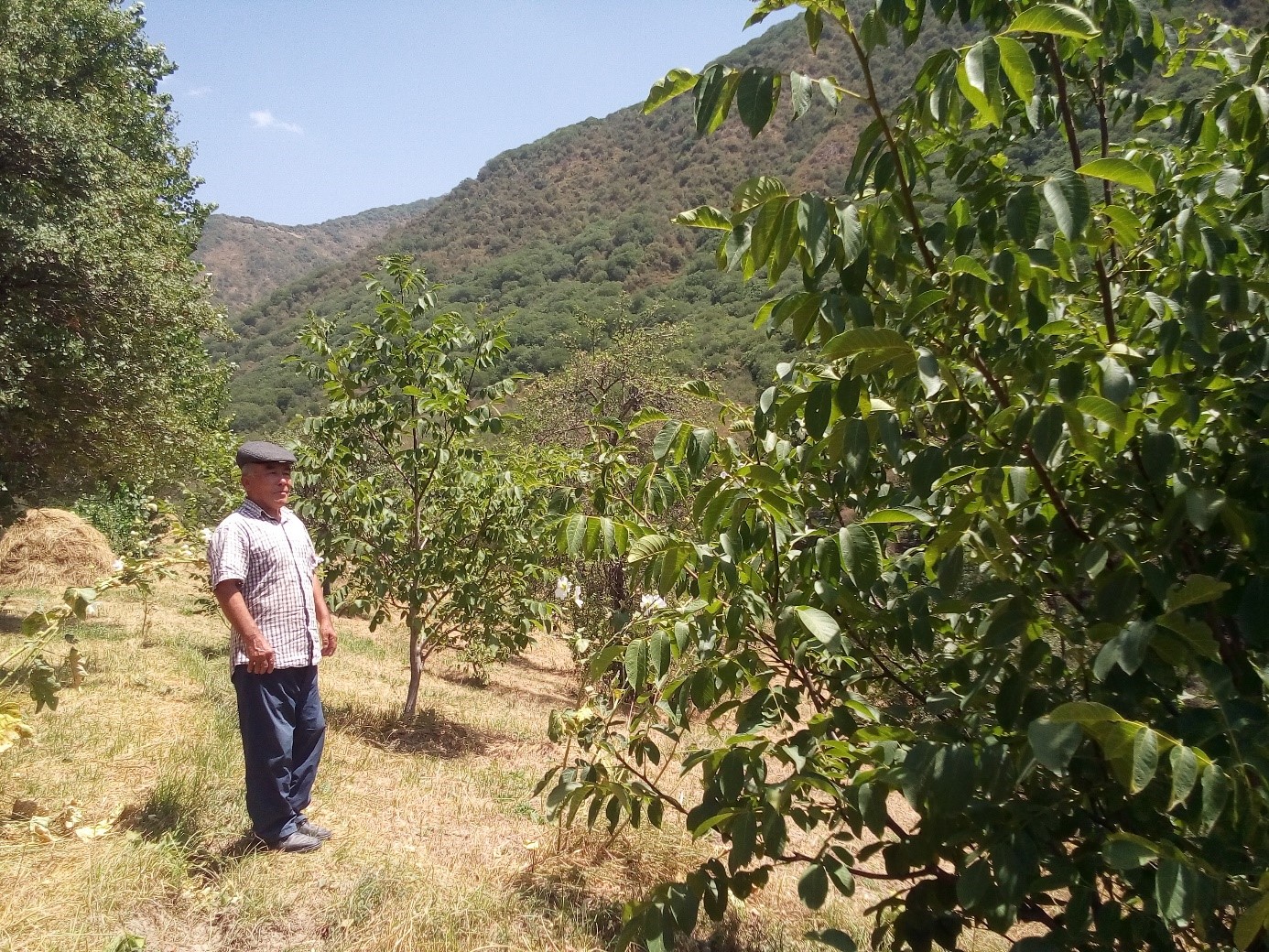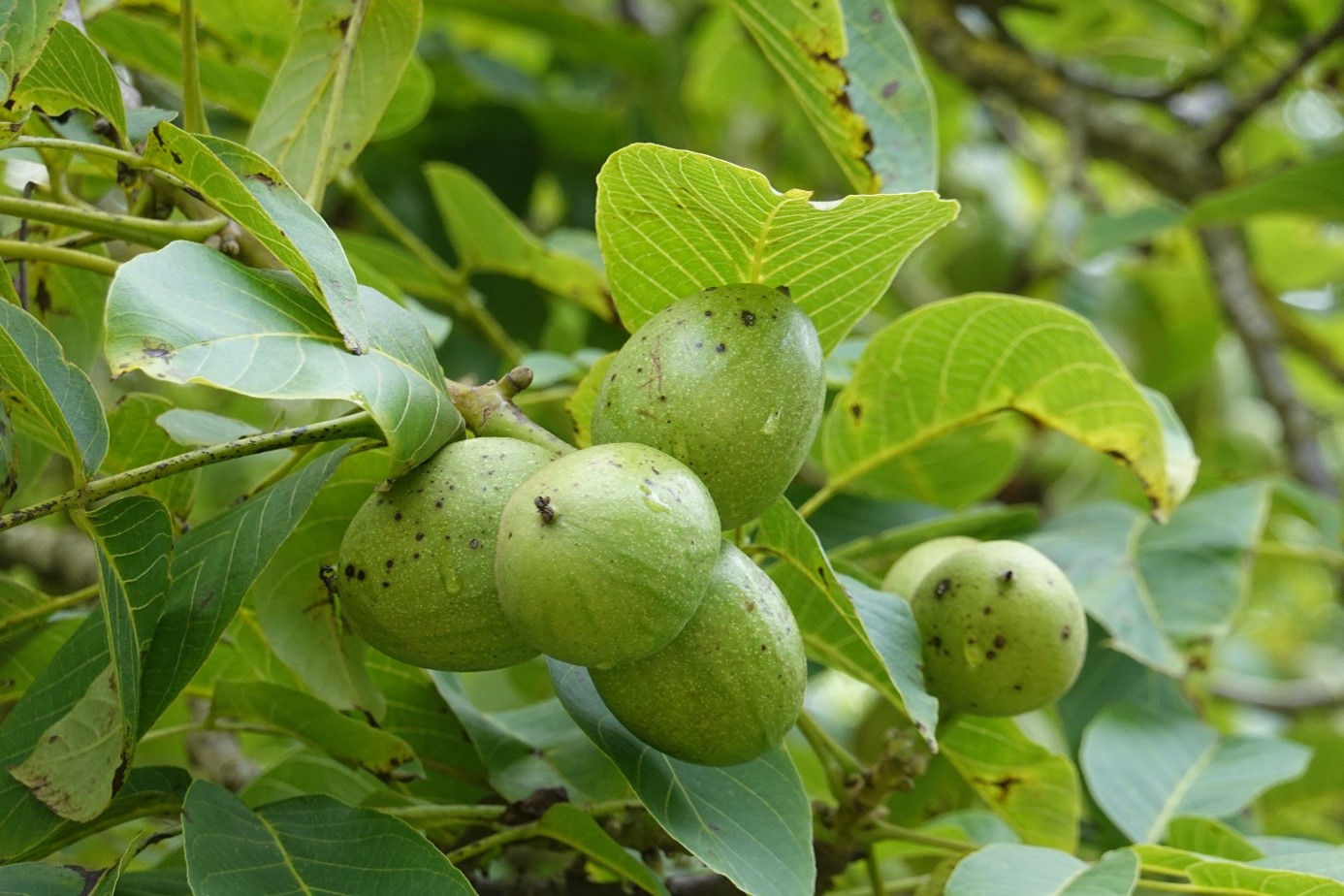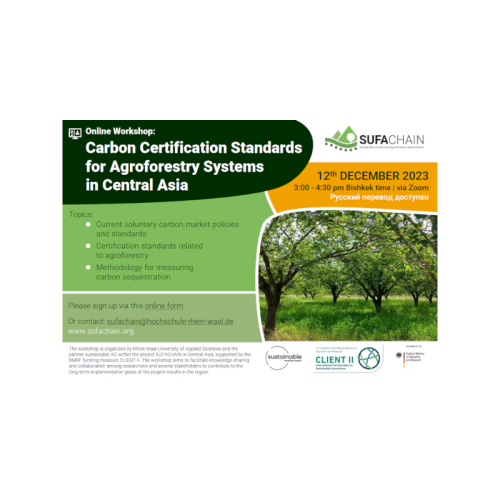

Life on land
Responsible consumption and production
Zero hunger
Coordinator: Rhine-Waal University of Applied Sciences
Contact: Dr van Bruggen
Address: Marie-Curie-Straße 1, 47533 Kleve
Phone.: +49 2821 806 73 - 0
Email: jannike.vanbruggen(at)hochschule-rhein-waal.de
Website: www.sufachain.org
Project partners in Germany
- Rhine-Waal University of Applied Sciences
- Dresden University of Technology
- BB med. product GmbH
- Organic Services GmbH
Project partners in Central Asia
- Kyrgyz State Technical University
- Technological University of Tadzhikistan
- World Agroforestry Centre (ICRAF)
- National Academy of Science of the Kyrgyz Republic
- Advantex LCC, Kyrgyzstan
- Altyn Bak LLC, Kyrgyzstan
- DANECO, Kyrgyzstan
- Global Agro Trade and Logistics Centre LCC, Kyrgyzstan
- Quality Management Centre, Tadzhikistan
- Khorezm Rural Advisory Support Service, Usbekistan
- Cooperative Hakimi, Tadzhikistan
- Aga Khan Foundation, Kyrgyzstan
- UNDP Regional Office Europe und GUS, Istanbul
Sustainable agroforestry value chains
The agricultural sector represents an important means of livelihood for the rural population in Central Asia. At the same time, the region's agricultural and forest landscapes are at risk of degradation, a situation made worse by population growth and economic development. The SUFACHAIN project therefore aims to analyse agroforestry systems and integrate them into local land use systems, while at the same time developing products and technologies that contribute to the sustainable use of resources and create local value.
Sustainable land use through the development of agroforestry value chains
Excessive water consumption, soil degradation and overgrazing are just some of the environmental problems caused by the agricultural practices in large parts of Central Asia. The common local practise of gathering wild fruit and nuts from natural forests contributes to the overuse and continuous degradation of these forests. Agroforestry systems that integrate nut and fruit-bearing trees into agricultural production therefore offer major potential for the sustainable generation of high quality foods in Central Asia, while simultaneously reducing negative environmental effects and helping improve adaptation to climate change. However, a range of factors currently makes the spread of these systems throughout the region difficult, including a lack of knowledge on the part of the players involved, unreliable marketing channels and an underdeveloped processing sector.

Through six content-based work packages, the SUFACHAIN project therfore contributes to the sustainable cultivation of the agricultural and forest landscapes of Central Asia. The project supports (1) the analysis and design of sustainable agroforestry systems for nut and fruit production, (2) quality improvements in the foods made from agroforestry products, (3) the development of more efficient technologies for the re-use of waste materials from the processing chain (4) the improvement of marketing channels thanks to transparency along the supply chain, (5) the increase of local value by enhancing the performance of ecological and social ecosystems (e.g. by means of carbon certificates and product certification) and (6) the development of attractive market niches for agroforestry products. This aims to increase the profitability of agroforestry systems and support their spread. As such, SUFACHAIN directly contributes to the sustainable management of land, forests and other natural resources in Central Asia, while at the same time improving income, value creation and business opportunities for the local population.
Comprehensive innovative approach
The development of agroforestry systems and the corresponding value chains is a complex undertaking. Adopting an interdisciplinary approach, and in close cooperation with Central Asian project partners, the project team therefore examines technological, ecological and socio-economic issues. The work within the individual work packages includes agronomic field trials, microbial and physicochemical laboratory analyses, the development of software to improve transparency in the supply chains, socio-economic surveys, feasibility studies and case studies.

Use of the findings
The SUFACHAIN project results will include:
- recommendations regarding sustainable agroforestry systems for agricultural consultants in Central Asia;
- improvements within the production process for processing dry fruit, with a view to increasing product quality and creating value;
- a prototype of a high quality processed food made from agroforestry products, including a business plan;
- a high quality application for walnut or apricot kernel shell waste within the cosmetics industry;
- an integrity platform for agroforestry supply chains;
- the evaluation of ecosystem performance and a roadmap for voluntary carbon certification as a recommended course of action for land users and political decision-makers;
- a culinary tourism offer in Central Asia.
The Central Asian SMEs and partner organisations involved in the project will put these project results directly into practice. Furthermore, the results will be made available to other interested land users, food-processing SMEs and political decision-makers, as well as to the scientific community.
SUFACHAIN: Webinar on feasibility study

SUFACHAIN: Successful training on fruits and nuts processing technologies in Osh, Kyrgyzstan

SUFACHAIN: project workshop in Tashkent, Uzbekistan
SUFACHAIN: Invitation to the online workshop on carbon certification in agroforestry systems in Central Asia

Project kick-off SUFACHAIN

